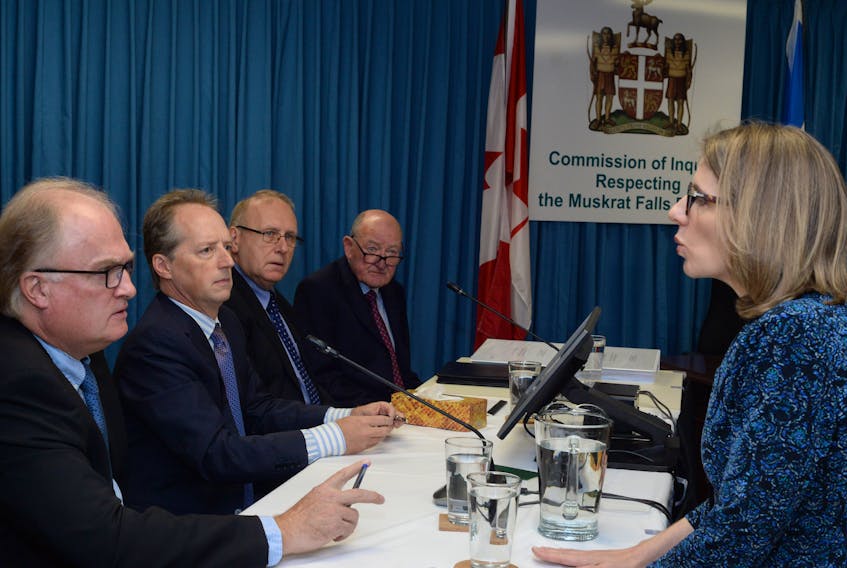Four former members of Nalcor Energy’s board of directors, responsible for weighing the options for powering Newfoundland and Labrador, say they expected to be notified of any significant risks for the Muskrat Falls hydroelectric project.
They wanted the risks in front of them, but testified they didn’t recall an early assessment suggesting only a one per cent chance the project’s proposed schedule would be met.
“I’d be very concerned if information was being withheld from the board that the board should have received. Absolutely,” Ken Marshall, one of the four board members, said Monday when asked about the related evidence from earlier in the inquiry hearings.
Marshall, Tom Clift, Terry Styles and Gerry Shortall were at the Muskrat Falls Inquiry as a panel on Monday, describing the years of their time and effort on pre-project review, considering alternative options, ultimately leading to the sanctioning of the Muskrat Falls project.
In reporting to Commissioner Richard LeBlanc, auditors with Grant Thornton testified Westney Consulting (a risk consultant looking at the proposed project for Nalcor Energy) informed Nalcor Energy the schedule being proposed for the hydroelectric dam was very aggressive.
The auditor’s report quoted an email from Paul Lemay, an estimator with SNC-Lavalin, to Jason Kean, a member of the Nalcor Energy project team. It stated: “This is a quite aggressive schedule because of the huge quantities involved in a relatively short period of time and although the day/cycle ratio seems to me reasonable, the fact remains that, running at a pace of some 480 m3/day for almost three consecutive years, at every day, will remain quite a challenge! I suggest we put a time or money provision in our contingency plan, to overcome a possible failure that may occur.”
A graphic noted to be part of a presentation made by the project team to the auditors was included as evidence the “one per cent” chance was communicated.
“This (slide) meant that there was a 99 per cent chance that the schedule for first power (in mid-2017) would not be met,” the auditor’s report stated.
The project management team was said to have notified Nalcor Energy executives. But was it discussed by the board? Board minutes did not record all subjects raised in board meetings, and the witnesses confirmed they no longer had notes from those meetings — many being kept on Nalcor Energy-issued iPads, wiped following their time with the corporation.
“I’m pretty sure we didn’t have that information,” Shortall said, when asked about the specific percentage on the construction schedule, adding it would have been part of the board’s detailed discussion before the project was pursued further.
He also said it wouldn’t have necessarily ruled out Muskrat Falls as the best option.
On specific conversations, certainties were difficult, given the years that have passed.
That included certainty on how a suggested $300-million (later $500-million) “strategic risk” was dealt with, although it was suggested in a Nalcor Energy report, a document considered by the board in an essential decision to allow the project’s progression, that the provincial government was both aware of and accepting of it as potential, additional cost.
All four board members testified they did their level best to act in the best interests of the province throughout their time with Nalcor Energy and the boards responsible for its subsidiaries. They even appealed to the province to appoint more board members, with experience in areas such as finance, engineering, megaprojects and electric planning.
“There was never a marriage at any cost to Muskrat Falls,” Marshall said.
Styles was one of four appointments made to the board of directors in June 2012, months before the decision to green light the project, along with former mayors Al Hawkins and Leo Abbass, and lawyer Erin Breen. There were eight board members at the time the project was sanctioned at the end of 2012, the other four being: Marshall, Clift, Shortall, and president and CEO Ed Martin.
The four-man panel of former board members is due back on the stand Tuesday.









